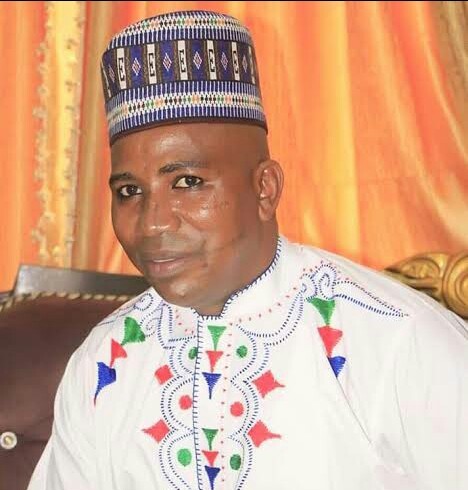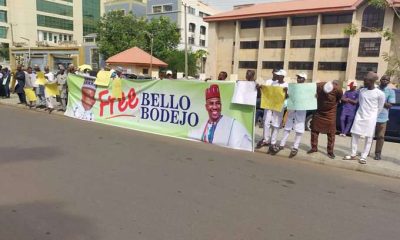Editorial
Editorial: Miyetti Allah Vigilante: An audacious affront taken too far

The Fulani-dominated socio-economic association, Miyetti Allah Kautal Hore, recently announced that it had set up a nationwide security outfit ostensibly to defend its interests and curtail security challenges confronting its members as they ply their trade across the country.
According to the National President and Secretary of the association, Bello Bodejo and Saleh Alhassan, the outfit, code-named Miyetti Allah Vigilante, is to assist security agencies in checkmating such crimes as kidnapping, cattle rustling and banditry.
The reactions of many on the formation of the security outfit by an ethnic-tinged socio-economic group, and especially from Southern socio-cultural organizations, has been one of swift apprehension and condemnation.
It is seen by them as an expression of audacious effrontery on the collective sensibilities of other ethnic nationalities and has drawn the ire of socio-cultural and political groups as the Yoruba-linked Afenifere, the Igbo Ohanaeze Ndigbo and Niger Delta’s PANDEF, who have taken exception to the idea of establishing the vigilante group all across the country and describing such a move as an act of unacceptable provocation with every potential to stoke inter-ethnic tension and further heat up the polity.
Indeed, this newspaper is miffed at the fact that to date the Presidency, the Office of the Attorney General of the Federation, the Inspector General of Police and the Director of the Department of State Security, DSS, have not waded in and called the leadership of the Miyetti Allah to order on the implication of outsourcing to themselves a function that they have in other instances insisted was about the exclusive preserve of federal government.
The questions that immediately arise now are: in what capacity has the group now moved to create a national security outfit? Has it replaced the federal government as the subsisting authority vested constitutionally with the mandate of maintaining law and order as the FG itself has variously argued in the past? What jurisdiction does it have to extend its operation beyond the Northern fringes to even the Southern belt of the country? These are pertinent questions deserving immediate answers.
What the Miyetti Allah group has moved to establish in the eyes of the law is indeed what can be termed a parallel national police force, more so since its outfit is not regionally localised as say, Amotekun, the security organization created by the Southwest to curtail the heightening rate of criminality in the region. We are therefore of the view that, at the minimum, the Miyetti Allah security outfit should be localised, rather than giving it national colouration.
The arguments by the Miyetti Allah leaders that the vigilante would operate according to the constitutional provisions and legal requirements of the country are, going beyond the surface of things, hollow, self-serving and illogical, given that its national operations plan has already put it in a place where it is infringing on the law of the land through its constituting itself into another national police force.
Viewed in another light, the establishment of the Miyetti Allah vigilante is another grave indictment of, and an indication of the seeming collapse of our security architecture, as well as the inability of the federal government, to provide security for the citizenry. And with the benefit of hindsight, if earlier calls for the introduction of state police had been heeded by the authorities, there wouldn’t perhaps have been a need for the institution of regional security outfits as Amotekun, not to talk of the now bewildering move to set up a parallel national police force!
Underscoring the present challenge also is the fact that the Miyetti Allah group is a non-state actor. It is not a regional or state government. It is highly disturbing then that a socio-cultural organization that is non-state actor would resort to arming itself and claim the role of government with no objection from the central government.
And this is even more disturbing when we review the data of wanton killings in the country in recent time. The United States Council on Foreign Relations (CFR) says it has documented at least 19,890 deaths in Nigeria since June 2015, just after President Muhammadu Buhari assumed office on May 29, 2015.
This is as the United Kingdom-based Christian Solidarity Worldwide (CSW) disclosed that Fulani militias had killed 1,061 people in about 106 attacks on communities in Central Nigeria in the first quarter of 2018. Continuing, the group says the figure has even doubled by May 2020. Also, CSW says that 39 other attacks on communities in the southern parts of the country by the militia claimed a further 600 lives.
From all known facts, there has never been a period in the history of the country when we have witnessed such high level of criminality, breakdown of law and order, and a seeming atmosphere of a criminal state-within-a- state scenario, as now, appears to be the case; not even during the Nigerian Civil War. The federal government owes it as a duty to protect the lives and property of citizens, and failure to perform this role erodes the authority of government.
There have been widespread animosities, a war of attrition, and wanton killings between Miyetti Allah and farming communities in the North Central and other parts of the country. In the process, thousands of innocent people have been victims. To now allow a central party in the crisis form a national vigilante calls into question the neutrality of government in the long-running conflict involving the nomadic herdsmen and the settled farming communities.
Even more troubling is the fact that many Nigerians are convinced over what they see as an affinity of sorts between the promotion of the controversial Water Resources Bill that is presently stirring dust at the National Assembly and the greater ambitions of the Miyetti Allah group. Much as we do not overly and categorically subscribe to this association, we believe that the federal government ought to come out clean on all of this by genuinely distancing itself from the group. And the obvious way to do this in our view is to openly caution the Miyetti Allah on its national security ambitions.
As a newspaper, we hold no grudge against the Miyetti Allah’s vigilante as long as its operations are confined to its basic originating geographic locality. We understand the genuine needs of genuine herdsmen that we have known over the years to be essentially peace-loving, and there is, therefore, a continuing need for the Inspector-General of Police and the national security architecture to protect peace-loving pastoralists from cattle rustlers.
What is highly contentious is that in the last couple of years, we have seen a rise in what could be called the terror and impunity levels on the part of many cattle herding groups, which is strange, and this has led to a widespread belief that some infiltration of the groups has already been carried out by such terror networks as Boko Haram and “vicious bandit – Fulani herders from across the Sahel.’
Equally, the current leadership of Miyetti Allah has given Nigerians cause to worry, given the way they routinely defend many of these killings when they occur as just being mere reprisals, when evidence on the ground now and again, points to the contrary. This has built up a huge mistrust of them, and given rise to the perception of a hidden agenda, given also the pattern of many of these attacks and the modus operandi which they employ against farming communities in the North Central and other mainly Christian farming settlements in Southern Nigeria.
So it is a hard sell to believe that the intended Vigilante is not meant to further the groups’ now seemingly established terror disposition and proclivities.
In addition, we think that the Miyetti Allah’s assurance that it would commence the process of detailed documentation of the violence against Fulani pastoralists, including the collection of exhibits and all relevant information, to isolate the perpetrators of the violence, arrest and prosecute them to forestall reprisals is by all standard a wink in the dark.
What is logical is that it is rather the police that should have been undertaking such a role over time and what is needed now is for the police to act with all decisiveness as a means of putting an end to the continuing sceptre of violence.
Again for the Miyetti Allah leaders to be frowning at the “alleged continued extra-judicial killings of Fulani pastoralists by some security agencies in the country, and calling on the National Human Rights Commission, NHRC, to investigate the atrocities and ensure justice is served sounds hollow. But our reading is that such preposterous statement could only have been encouraged by the fact that, to date, none of the perpetrators of terror by suspected Miyetti Allah – associated elements have been called to account, and nothing testifies more about this than the impunity and mayhem in Southern Kaduna.
Also notable is the fact that several other ethnic nationality groups and Southern leaders, governors included, have voiced their displeasure and sounded a note of warning that the Vigilante will not be allowed to operate in their states.
As things stand already, the country is beset with enough challenges, and stoking the ember of another crisis will not augur well for the country. We call on the federal government to call the leadership of Miyetti Allah to order.






